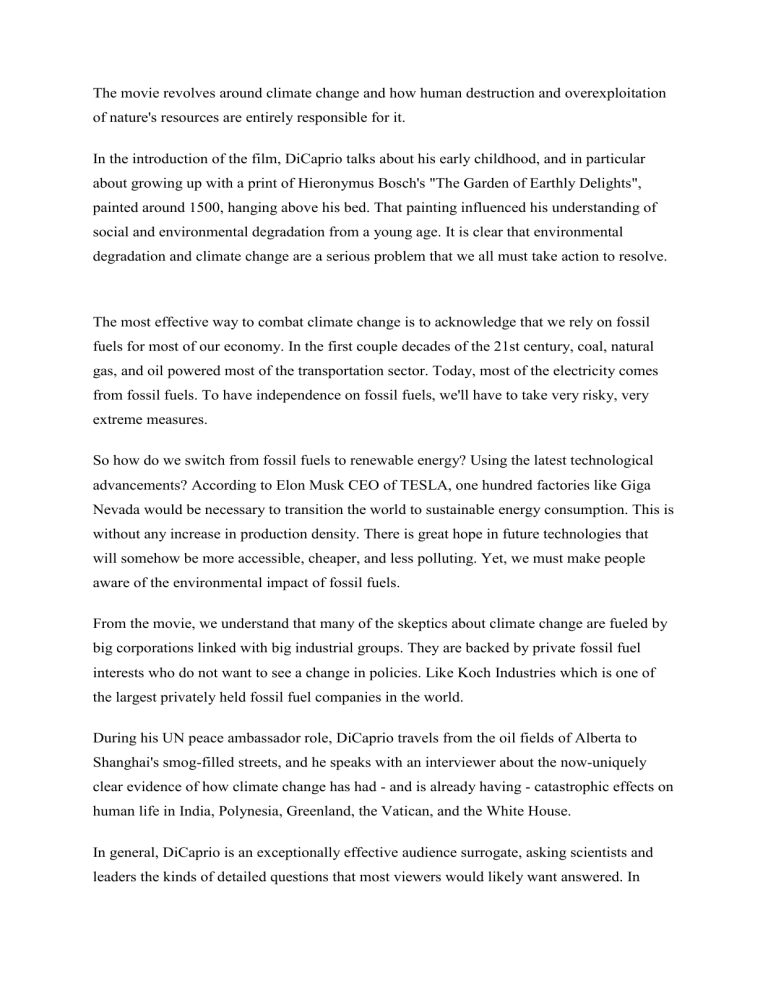
The movie revolves around climate change and how human destruction and overexploitation of nature's resources are entirely responsible for it. In the introduction of the film, DiCaprio talks about his early childhood, and in particular about growing up with a print of Hieronymus Bosch's "The Garden of Earthly Delights", painted around 1500, hanging above his bed. That painting influenced his understanding of social and environmental degradation from a young age. It is clear that environmental degradation and climate change are a serious problem that we all must take action to resolve. The most effective way to combat climate change is to acknowledge that we rely on fossil fuels for most of our economy. In the first couple decades of the 21st century, coal, natural gas, and oil powered most of the transportation sector. Today, most of the electricity comes from fossil fuels. To have independence on fossil fuels, we'll have to take very risky, very extreme measures. So how do we switch from fossil fuels to renewable energy? Using the latest technological advancements? According to Elon Musk CEO of TESLA, one hundred factories like Giga Nevada would be necessary to transition the world to sustainable energy consumption. This is without any increase in production density. There is great hope in future technologies that will somehow be more accessible, cheaper, and less polluting. Yet, we must make people aware of the environmental impact of fossil fuels. From the movie, we understand that many of the skeptics about climate change are fueled by big corporations linked with big industrial groups. They are backed by private fossil fuel interests who do not want to see a change in policies. Like Koch Industries which is one of the largest privately held fossil fuel companies in the world. During his UN peace ambassador role, DiCaprio travels from the oil fields of Alberta to Shanghai's smog-filled streets, and he speaks with an interviewer about the now-uniquely clear evidence of how climate change has had - and is already having - catastrophic effects on human life in India, Polynesia, Greenland, the Vatican, and the White House. In general, DiCaprio is an exceptionally effective audience surrogate, asking scientists and leaders the kinds of detailed questions that most viewers would likely want answered. In perhaps the film’s most intellectually stimulating moment, Sunita Narain challenges him on his own America-centric bias during a visit to India, by posing a question. By implementing environmental policies that have proven hesitant to be adopted by the United States, how can a nation like India risk its own tenuous economic development? DiCaprio's view of NASA's climate simulation illustrates even more clearly the urgency of the matter. The biggest misconception about climate change is that everything gets warmer. Using the most advanced precipitation satellite in the world we see that one of the biggest impact of climate change is the moving of precipitation. Equatorial countries are experiencing more droughts, glaciers are melting faster, and sea levels are rising but we must not lose hope. In conclusion, this film has demonstrated from top to bottom that it is urgent. We should all do our part to reduce our carbon footprint, and the governments should implement environmentally friendly projects for energy production to keep our planet from being destroyed. Scientists should conduct more experiments on alternative energy production technologies to fossil fuels. Each of us has a responsibility to change, and only through our joint efforts can we find a solution.



